
Gwyllyn Samuel Newton "Glenn" Ford was a Canadian-American actor who often portrayed ordinary men in unusual circumstances. Ford was most prominent during Hollywood's Golden Age as one of the biggest box-office draws of the 1940s, 1950s, and 1960s, who had a career that lasted more than 50 years. Although he played in many genres of movies, some of his most significant roles were in the film noirs Gilda (1946) and The Big Heat (1953), and the high school angst film Blackboard Jungle (1955). However, it was for comedies or westerns that he received acting laurels, including three Golden Globe Nominations for Best Actor in a Comedy movie, winning for Pocketful of Miracles (1961). He also played a supporting role as Clark Kent's adoptive father, Jonathan Kent, in Superman (1978).

John Gilling was an English film director and screenwriter, born in London. He was known for his horror movies, especially those he made for Hammer Films, for whom he directed The Shadow of the Cat (1961), The Plague of the Zombies (1966), The Reptile (1966) and The Mummy's Shroud (1967), Cross of the Devil (1975), among others.
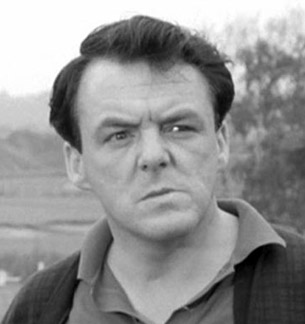
Victor Jack Maddern was an English actor. He was described by The Telegraph as having "one of the most distinctive and eloquent faces in post-war British cinema."
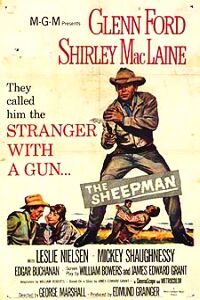
The Sheepman is a 1958 American Western comedy film directed by George Marshall and starring Glenn Ford, Shirley MacLaine, and Leslie Nielsen.

Arthur Hambling was a British actor, on stage from 1912, and best known for appearances in the films Henry V (1944) and The Lavender Hill Mob (1951). In 1939 he appeared in the West End in N.C. Hunter's comedy Grouse in June.

Tomorrow at Ten is a 1962 British thriller film directed by Lance Comfort and starring John Gregson, Robert Shaw and Kenneth Cope.

Blackmailed is a 1951 British drama film directed by Marc Allégret and starring Mai Zetterling, Dirk Bogarde, Fay Compton and Robert Flemyng. It was adapted from a novel by Elizabeth Myers.
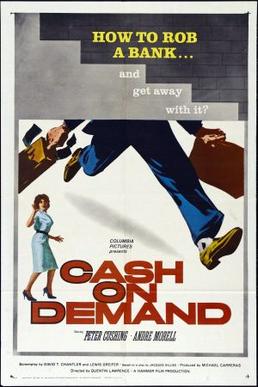
Cash on Demand is a 1961 British black and white neo noir crime thriller film directed by Quentin Lawrence and starring Peter Cushing and André Morell. The film company Hammer Film Productions invested approximately £37,000 to produce the film. To optimise its budget the film uses a limited number of sets; an interior street set, the trading area of a bank, the manager's office, the stairway between office and the vault, and the interior of the vault itself. The screenplay was adapted from the 1960 Theatre 70 teleplay The Gold Inside, also directed by Lawrence, and featuring André Morell and Richard Vernon in the same roles.

The Lost Hours is a 1952 British film noir directed by David MacDonald and starring Mark Stevens, Jean Kent and John Bentley. It was produced by Tempean Films which specialised in making second features at the time, and marked Kent's first descent into B films after her 1940s stardom. It was shot at Isleworth Studios and on location around London. The film's sets were designed by the art director Andrew Mazzei. It was released in the United States the following year by RKO Pictures as The Big Frame.

Strictly for the Birds is a 1964 British comedy film directed by Vernon Sewell and starring Tony Tanner, Joan Sims and Graham Stark. Terry Blessing seems to be having a lucky day, winning at gambling, until a woman with whom he'd had an assignation six years previously 'phones him and claims her child is his son.
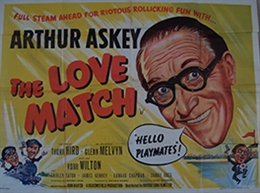
The Love Match is a 1955 British black and white comedy film directed by David Paltenghi and starring Arthur Askey, Glenn Melvyn, Thora Hird and Shirley Eaton. A football-mad railway engine driver and his fireman are desperate to get back in time to see a match. It was based on the 1953 play by Glenn Melvyn, one of the stars of the film. A TV spin-off series Love and Kisses, appeared later in 1955.

Night Train for Inverness is a black and white 1960 British drama film directed by Ernest Morris and starring Norman Wooland, Jane Hylton and Dennis Waterman. It is notable as the film debut of Dennis Waterman. The film was referenced in an episode of the Minder Podcast.

Impulse is a 1954 British film noir directed by Cy Endfield and starring Arthur Kennedy, Constance Smith and Joy Shelton. It was shot at the Walton Studios near London with sets designed by the art director Wilfred Arnold.
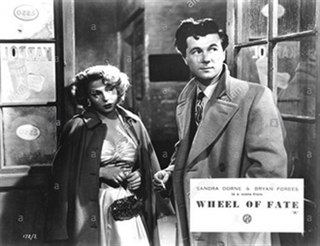
Wheel of Fate is a 1953 British drama film directed by Francis Searle and starring Patric Doonan, Sandra Dorne and Bryan Forbes. The screenplay concerns a man who turns to crime to raise the money he needs to spend time with a woman with whom he falls in love. It was produced as a second feature and shot at Riverside Studios in London. The film's sets were designed by the art director Wilfred Arnold. It was released by Rank's General Film Distributors.
The Fall of the House of Usher is a 1950 British horror film directed by Ivan Barnett and starring Gwendoline Watford, Kaye Tendeter and Irving Steen. It is an adaptation of the 1839 short story of the same title by Edgar Allan Poe.

Street of Shadows is a 1953 British film noir written and directed by Richard Vernon and starring Cesar Romero, Kay Kendall and Edward Underdown. It was shot at the Merton Park Studios in London and on location in the city's West End. The film's sets were designed by the art director George Haslam. It was an early production of Anglo-Amalgamated who had signed a deal with Lippert Pictures who distributed the film in the United States. While much of the company's output at the time were second features, this was a more expensive film aimed at the first feature market.

The Impersonator is a 1961 low-budget black and white British thriller film directed and co-written by Alfred Shaughnessy. An American angle and U.S. character actor John Crawford were incorporated to give this second feature some transatlantic box office appeal.

Counterspy is a 1953 British thriller film directed by Vernon Sewell and starring Dermot Walsh, Hazel Court and Hermione Baddeley. A mild mannered accountant comes into possession of secret papers that both the government and a spy ring are after. Alexander Gauge turns in a good performance as a villain rather in the mould of Sydney Greenstreet.
The Voice Within is a 1946 British crime drama film directed by Maurice J. Wilson and starring Barbara White, Kieron Moore and Brefni O'Rorke. It was the film debut of Moore who went on to appear in several major roles over the following years. It was shot at the Riverside Studios in Hammersmith.

















